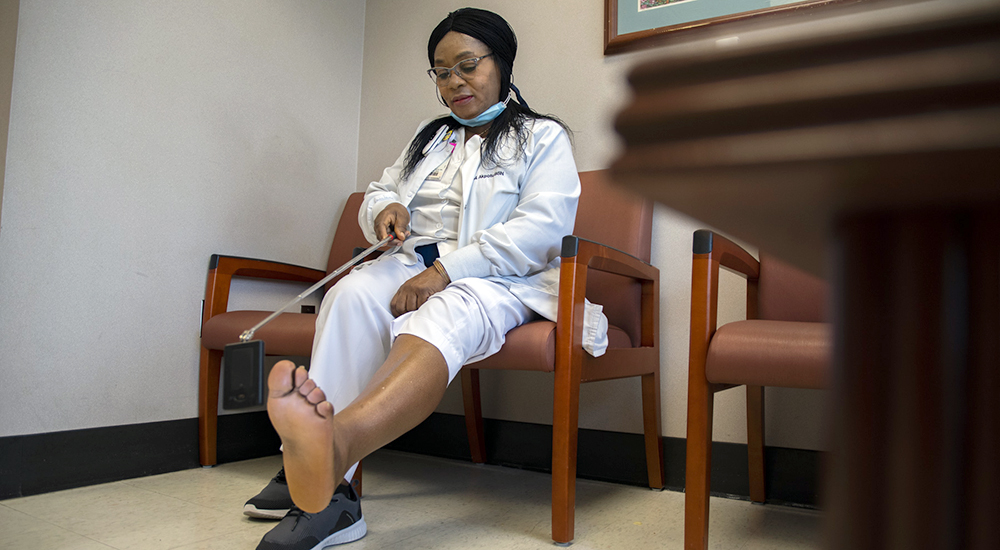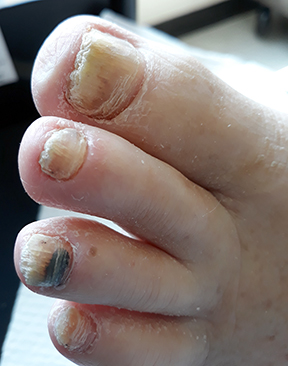Maria Akpotu believed that Veterans needed an easy-to-use tool that allows them to check their extremities daily.
She researched the trend of limb amputations in Veterans. Consequently, she found that Veterans were four times more likely to have limb amputations than the general population. The risk was even higher for diabetic Veterans and those with mobility issues.
As a result, Akpotu created the Project Comprehensive Diabetic Footcare Bundle at the Memphis VA. The goal was to help Veterans detect early changes in their feet and extremities so they can report those changes promptly to get treatment to prevent loss of limbs.
The project expects to reduce the care cost from diabetic foot complications and reduce the number of associated hospital visits.
Akpotu discussed her plan with her son and daughter and asked them to help her find a tool that would enable Veterans with mobility issues to monitor their limbs without having to bend over.
With their assistance, she found a solution. Akpotu purchased several handheld telescopic, expandable flexible lighted mirrors. These mirrors allow patients with limited mobility to monitor their limbs without being in a compromising position.
She also developed a simple education pamphlet to teach diabetic Veterans and staff proper self-care.
“By putting this tool in the hands of Veterans and their families, we can give control of self-care to them,” Akpotu said. “Early detection is key. With this tool, we can achieve a reduction in emotional, physical and financial costs to the VA, Veterans and their families. I have done everything in my power to provide my patients and their caregivers with the tools they need to educate, motivate and empower each other.”
What does a diabetic see on their feet that indicates a problem?
The answer? Anything unusual. Report changes to your doctor right away.
Changes include:
- Pain and redness (infection)
- Discoloration (poor circulation, feeling too cold or too hot in your feet, deep tissue injuries)
- No feeling, no sensation, numbness or tingling (neuropathy)
- Wounds (cuts, scrapes, blisters, corns, calluses, bunions)
- Tightness (swelling)
- Ingrown toenails
Staff at the Memphis VA Medical Center implemented the project. Akpotu is seeking funding for her project through the VHA Innovators Network to expand it throughout the Veterans Health Administration.
The goal is prevention
Veterans with diabetes can prevent small issues from getting worse by:
- Using a hand-held, telescopic mirror to check their feet daily
- Checking between the toes and the soles of the feet daily
- Washing feet daily with soap and water
- Drying feet well, especially between the toes
- Filing toenails. Do not clip the nails or use a razor to trim them
- Reporting immediately any lesion, wound, discoloration, swelling, pain, redness or other change from normal to a doctor
Akpotu has been a registered nurse for over 40 years.
Willie Logan is a public affairs officer and Romeo Lucchesi is a public affairs specialist/videographer for the Memphis VA Medical Center.
Topics in this story
More Stories
The Medical Foster Home program offers Veterans an alternative to nursing homes.
Watch the Under Secretary for Health and a panel of experts discuss VA Health Connect tele-emergency care.
The 2024 National Veteran Suicide Prevention Annual Report provides the foundation for VA’s suicide prevention programs and initiatives.










I was thinking you could take a picture of feet with a selfie stick, that way you could compare pics.
Thanks for this article. It is very difficult to keep track of the bottom of my feet. I have struggled trying to monitor the bottom of my feet. After reading this article I checked on Amazon and found one that will work for me. Many Thanks
I appreciate this article. Since I am retired and residing in the Philippines…being serviced by the Manila VA that doesn’t offer anything like you mentioned, where can a Veteran obtain the device that you are speaking of?
Thanks for the update and refreshers course! You guys are the best!!!!
These tips are great for people like us who have diabetes. We live well but we must be careful.